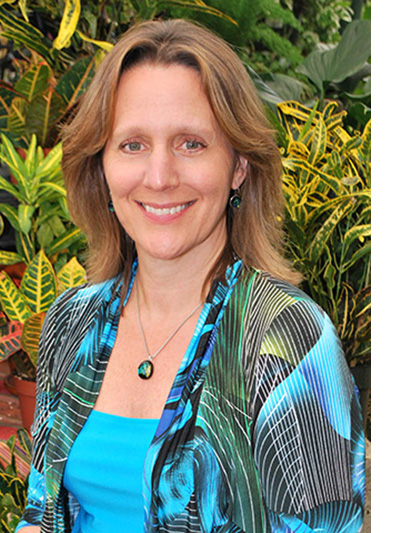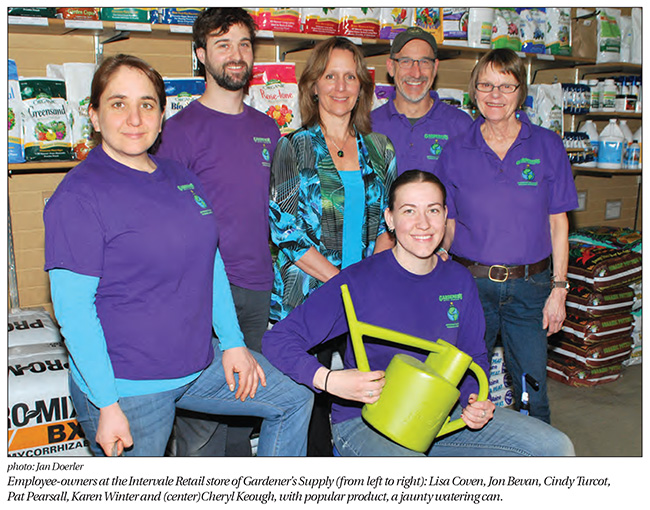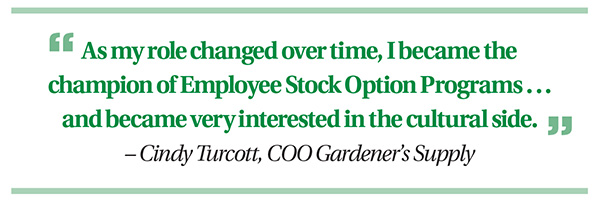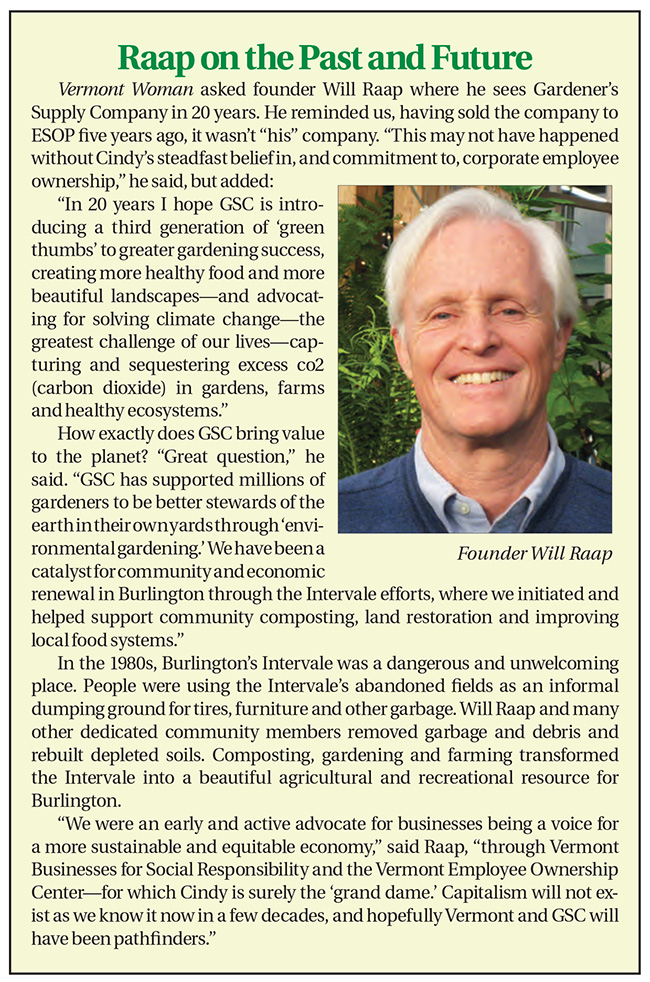| Cindy Turcot Grows a Company and Profits for Employees | |
| Allison Teague | |
Cindy Turcot, Chief Operating Officer, has tended a crop of employee shareholders who have grown Gardener’s Supply of Burlington and Williston into the nation’s largest marketer of gardening products. Photo: Jan Doerler |
“I have been fortunate that throughout our evolution, I have been able to work for an amazing founder,” she said, referring to Will Raap, now chairman of the board. Turcot first began in customer service and data entry; but Raap credits Turcot (see sidebar) with committing to a new ownership model and making it happen. The company decided to invest in its employees in 1987, says Turcot, and has relied on Vermont employees’ inherent frugality, independence and creative thinking. “We adopted an Employee Stock Ownership Program (ESOP) that allows all employees to earn stock and share in company profits.” As of December 2009, Gardener's Supply became 100 percent employee-owned. Turcot has been integral to building the company from its humble beginnings in 1983 to its becoming the nation’s largest catalog-and-web marketer of gardening products and accessories. They now have two garden centers in Williston and Burlington, and millions of customers, with matching revenues and 225 year-round employees. |
|
Turcot grew up in Buffalo, New York, in a family business still owned and run by family members. She credits that experience, not just her education in business administration and economics, for Raap’s choosing and later promoting her. Turcot described how her father would pour himself a cup of coffee, each morning: then he walked through the screen print shop and greeted all his employees by name, stopping, talking, and asking them how they were. That kind of management connection with employees was important to Raap, Turcot said. He did not want just a numbers-cruncher. She recalls, “He wanted a human face in the financial department.” Someone his employees felt comfortable talking to. That early interest in the employees led to their seeking out an alternative business structure. Turcot feels it was key to their eventual success and mission. “The benefit of being a 100 percent-employee-stock-owned company is the value of the company is distributed to all employees—instead of having the wealth in the pockets of a few at the top. It values all of us, at all levels,” Turcot said. In 1987, Turcot became the first financial and human resource’s department's head. She recalled how ESOP had started. “Really, it was [Raap] that wanted our employees in an employee-owned company.” He asked Turcot to get educated in employee-owned company structure options. Studies showed, and Raap believed, that when employees had a vested interest in the company they worked for, they performed better. “As my role changed over time, I became the champion of ESOPs within Gardener's Supply (GS). I became the business manager/office manager, then became head of Human Resources and Finance. All along, I was the person who learned and understood the technical side, and I became very interested in the cultural side.” She led the operational move to employee-ownership. “I like the idea that wealth is put out to all employees not just the top few. We grew over time and it became ownership succession, first two percent, then three percent. We were looking at it just being an employee benefit, that [employees] all got rewards for their work.” An employee-owned stock option plan is one where the company invests in the company stock in the employee's name each year, and as the company grows, their stock grows, and the value goes up or down, depending on how well the company does each year. Turcot explained: “At GS, this is set up as a retirement account for approximately 225 year-round and 125 seasonal employees; it is similar to a 401k (which is also available to employees). At retirement, that stock, as valued, is available to them.” Turcot said she came to understand and believe what Raap thought true: “If you have a participatory style management structure within a company that is employee-owned,” she said, “the statistics show that environment, versus a non-participatory one, will outperform. And an employee-owned company will do fewer layoffs than a non-employee owned company,” Turcot explained. “So, if you do not add the participatory management style, then you are just like every other company.” She said that GS has an involved and empowered workforce that everyone participated in. “It’s not a democracy,” Turcot explained further. “You are a shareholder, just like in any other company. A shareholder appoints the board, and the board appoints management, who hires the employees.” So while employees do not have a vote, Turcot said that she founded an ESOP committee. Made up of a shifting stratum of members from all departments and levels of the company, they meet regularly. Employees can attend and ask questions, or voice issues. Depending on the level of response needed, what comes up will either be handled within the departments, or taken to the department heads who meet regularly with top management to be considered, and then prioritized. “Employee participation is really important, and we believe in that,” Turcot said. “Why would you not want employees to have a voice? But it’s not a voting voice. It’s an input voice. Then hopefully management is making decisions with an ear toward what we are hearing. “So employees do not have a vote, but they work and contribute to the value of the company. With an ESOP, you are the beneficiary of shares of stock held in trust; the trustees of that trust are in charge of the stock,” Turcot said. The company stock is owned by company employees. The money, or value, of the stock is invested back into the company.
Turcot described the company’s “brownie for your thoughts” initiative. Management goes around to each department, saying, “Here's a brownie. What are you thinking?” Turcot has done this on several occasions. “And I was definitely educated by what I learned. I would not have known [the problems] they were working with, if I had not listened in the participatory process to what they were saying.” Turcot said this style of participation also gets the employees invested and interested in how well the company succeeds. It only makes sense to Turcot. “Why shouldn’t we all be committed to the company we work for? And why should we not get rewarded?” But Turcot said a big part of the success of ESOP comes from educating everyone in the company. That is one of her biggest tasks and an ongoing question. “How and what employees do impacts our performance,” Turcot said. “I am particularly interested in this cultural side. How do we educate about the financial health of the business? How do we make the connection for the employees? How do we make it fun, engaging, and an empowering place to be?” And then, as a result of performance, have the wherewithal to help the planet? Because, “Our goal is to improve the world through gardening,” Turcot stated. Bottom line, “You have to have a good financial performance to do good things for the people, the company, and the planet. Those are the three legs to our stool: people, profit, planet. The reward is to have money to do great work for the planet. So we've always got three legs, and we have just gotten bigger and bigger” with that formula, Turcot said. Turcot is considered by many to be the go-to person when it comes to ESOPs. One of the leading experts in the nation, Turcot has served as president of the Vermont Employee-Ownership Center, has been a past board member of the national ESOP Association, and currently serves as the Executive Vice President of the New England Chapter of the Employee Stock Option Plan (ESOP) Association. She travels all over the country, educating and advocating with law makers and legislators, as well as other companies. “Education is really the key,” Turcot says. Turcot has overseen Gardener’s Supply in-house ESOP committee for 27 years. “I learned all the technical aspects, and I started the ESOP committee—which is an across-department group engaged in learning, asking, what can we do to engage? And what can we do as members to promote the company? What can [stock ownership] mean to each of us actively?” She said, the committee also asked, “How do we keep employees connected, empowered to have a voice in the business? So I spend a lot of time thinking about that, making sure I am connected to as many employees [as possible.]” People on the committee have changed over time, but she is the constant and the biggest advocate for ESOP. “I am the connection between employees and management,” she said. “It started with 12 people in their 30s, when we started the ESOP committee. Now we have multiple locations, and it’s [still] a way to connect everybody together.” Another way she connects employees and management is to have town meetings, “where about 15 to 20 people meet with our CEO Jim Feinson every year. It’s not by department, but intermixed. He does a quick overview of corporate goals, but says ‘Bring your questions—Bring things forward.' The ESOP committee takes notes, as we get questions from staff. Then we decide what to do with them.” The ESOP committee writes reports on their own meetings to keep management informed, and also presents them to the board. “Its important for the board to know what staff is thinking,” Turcot noted. Throughout it all, Turcot says, she and Raap, now chairman of the board, have led from the top by example. She says the company works hard to be compassionate about individual employee needs, whether it is a life crisis or a trauma, or just needing to attend sports events of a family member. “We are very human in that way. We have a very healthy, very strong package for time-off, and we're flexible in meeting people's medical needs, or needs for their family—within reason, of course,” Turcot said.” She went further. “We have ‘heartful’ employees, and we are an employer that has heart. We are there for each other, when someone has a crisis in home life, and equally when working together at the work place.” Turcot stated, “Jim Feinson, the CEO, is the same, and we don't miss our kids’ events—lead from the top—we need to be there for our families.”
Naturally Turcot's involvement with gardening does not stop at the shop door. “It is enriching to have a beautiful garden,” she said. “There's nothing better than pulling into my driveway and seeing my garden and its beauty.” She used to have huge vegetable gardens, but is now a CSA member at Intervale. Her gardens draw a lot of attention from friends because of their calming effects, which she appreciates, as well. She said she is always “moving plants to other people's gardens. So it’s a social thing and a sharing both ways.” She often has “garden parties, where you're bringing and digging.” Winter is a favorite season for Turcot, an avid 'jack-jumper' as well as a downhill skier. Jack-jumping uses a single ski fixed with a seat that you sit on for your ride down the hill. She said her partner also jack-jumps; it was an early connection between them. “He pulled out this really old jack-jumper from his garage, and when I said I did that too, he was thrilled,” she laughed. Besides travel that is ESOP-related, Turcot loves international travel to Australia each year where her stepdaughter and granddaughter live. She also travels to Cambodia where her partner sits on the board of a school, “to spend time with the children each year.” Turcot and her son, in the company of former Boy Scouts and their moms, also take canoe trips all over the northeast. Boy Scout trips as troop leader “were really fun, because I took them where they'd never been before,” she recalled. She and her son are canoeing “a chunk every summer” of the Northern Forest Canoe Trail. Last summer they “did New York, and this summer we'll be doing Vermont.” Ellen Desjardin is Turcot's office manager and executive assistant. “She tells me I'm the boss,” Desjardin said. “I don't feel like it, but that's what she tells me. She is very open and clear and fun to work with,” she said. “I'm not in the dark, and there are no surprises. She'll teach me and show me if I don't know something.” And that, for Desjardin, makes coming to work everyday something she looks forward to. Peter Gaylord is the warehouse manager and has worked with Turcot for thirty years. He said there is a “trust level” between her and the staff that makes them feel that she is interested in their concerns, and is listening. He said she always gets back to them, too, which enhances that trust. Gaylord said, “She's always been that way.” “I have a real commitment to making a difference in the world,” Turcot had already admitted. “I hope I am making a difference. And hopefully for this organization that I lead by example. The truth is that I don't act at work any differently than I do at home. I believe that we should be who we are. I think every day needs to be filled with doing things with a positive intent, and hope that I am respectful. I truly am passionate and I care about our employees. “I want to create an environment here where I want to be,” Turcot said. “You know gardening is a great business to be in. You can't feel bad about it.”
|
|
| Allison Teague of Saxtons River is Vermont Woman’s environmental writer and a regular contributor.
|
|




